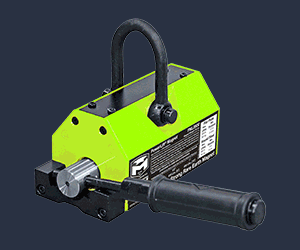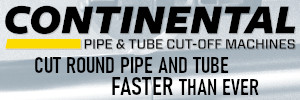He Who Brakes, Wins
To be able to produce 40,000 brakes a month and maintain consistent quality, Precima invested in four advanced vertical pick-up turning machine tools from EMAG to produce housings for brakes used primarily in wind turbines.
Posted: September 26, 2013
Brakes are used in many diverse branches of industry and for a variety of different applications, from forklifts to crane systems and industrial washing machines to stage technology and wind turbines. Precima Magnettechnik GmbH (Brückeburg, Germany) specializes in all of these types of braking systems.
Precima was founded in 1981 and now ranks among the most innovative of the traditional, family-run, medium-size companies. Its staff of approximately 150 employees develop and manufacture a wide range of electrically-operated clutches and brakes for all sectors in machine and plant manufacturing.
The program is divided into a number of design variants and covers, depending on application, a torque range of 0.5 Nm – 1200 Nm. The R&D department develops customer-specific solutions of the highest technical standard. A modern CNC production facility and process-optimized assembly lines turn out over 500,000 units per year. A high ratio of in-house production ensures maximum flexibility and short throughput times.
The combination of a number of processes such as hard turning and grinding on a single machine allows for the exploitation of considerable rationalization potentials. The advantages of the process combination hard turning and grinding lie in the complete machining of the workpiece, with greater flexibility and improved component quality. For example, in the machining of chucked components shown here, the combination of hard turning and grinding is state-of-the-art. Considerable potential still remains to be tapped, since not all processes that offer an advantage by switching to the combination of hard turning and grinding have been changed.
Reliability and longevity are two of the most important requirements for brakes, according to Precima. “Our brakes are often used in safety-critical systems such as lifts and cranes. When it comes to this kind of application, any failure would be unacceptable. Since its inception, Precima has not experienced a single failure of its safety-relevant braking systems. This fact highlights the quality of our products, of which we are very proud,” says Andreas Nagel, the manager of CNC operations at Precima.
OVER 40,000 BRAKES A MONTH
The company manufactures over 40,000 brakes a month. To be able to produce these quantities and maintain consistent quality, Precima relies on cutting-edge manufacturing technologies. Recently, the company invested in four vertical pick-up turning machine tools from EMAG Salach Maschinenfabrik GmbH (Salach, Germany). These machines produce housings for brakes used primarily in wind turbines.
Production consists of two islands with two vertical pick-up turning machines and a machining center each. The first VL 5 was acquired, then quickly followed by another VL 5, a VSC 7 and a VSC 315. Precima was convinced they had the right machines when their high degree of efficiency surprised everyone.
“We had tried vertical pick-up turning machines from other manufacturers before, but were repeatedly faced with quality issues,” recalled Nagel. “Quite simply, they all showed a lack of power. Now, with these machines, we are completely satisfied. Series production was up and running in an amazingly short time and, since then, we have been producing efficiently at desired production rates.”
Above all, it was the vibration characteristics of the machines that convinced Nagel. The housings are made of steel St52-3, a material that places great demands on the machining process. “In the past, we were repeatedly faced with the problem of vibrations that had an instant, negative effect on tool life and surface finish. Where these housings are concerned, our customers are so sensitive about quality that even a little scratch is unacceptable, despite the fact that it would have no effect on the efficiency of the brake. They, quite simply, expect absolute perfection,” smiles Nagel.
The EMAG turning machines met these requirements. The high degree of rigidity of the machines and the outstanding vibration damping quality of the base in Mineralit® (six to eight times better than that of cast iron) allows for the very high feed rates and cutting speeds required in precision hard-machining.
WORKING TOWARDS A COMMON GOAL
A machine is only as good as the person who operates it. For this reason, Precima decided to have their staff undergo a thorough training process. Nagel explains, “Our people were at EMAG for three days of intensive training. I was particularly impressed by the high proportion of practical training. After only three days, we were almost ready to operate the machines on our own. But in an effort to solidify the operating staff’s knowledge base and to give them a sense of security during the initial phase, we opted for some production handholding.”
EMAG provided Precima with two service engineers who, together with the Precima staff, set up the machines on their workpieces and answered any questions that came up. “In addition to that, we had an apprentice that attended right from the beginning, i.e., from the installation and commissioning stage onwards, so that he could acquaint himself in detail with the machine concept. He is now operating the machines almost with his eyes closed,” jokes Nagel.
SPEED PLAYS A DECISIVE ROLE
The high productivity rates of the machines did, of course, play a pivotal role in the decision to invest in EMAG machines. The workpieces are produced in families at a rate of 2,000 components per week, in 3 shifts plus 8 hours on Saturday. Process design also had to be completed in the shortest possible time.
Nagel adds, “We deal in top-quality products that are in high demand worldwide. Because of this heavy demand, we had to massively expand our production capacity, and that was only possible with a partner competent enough to react with the same dynamic. We found that partner in EMAG.”
In the end, it took just three months from project design and decision making, commissioning and staff training to running a fully functioning three-shift production operation.
Precima Magnettechnik GmbH, Röcker Straße 16, 31675 Bückeburg, Germany, +49 5722 893320-0, Fax: +49 5722 893320-2, www.precima.net.
EMAG LLC, 38800 Grand River Avenue, Farmington Hills, MI 48335, 248-442-6719, Fax: 248-477-7784, abrandemihl@emag.com, www.emag.com.















